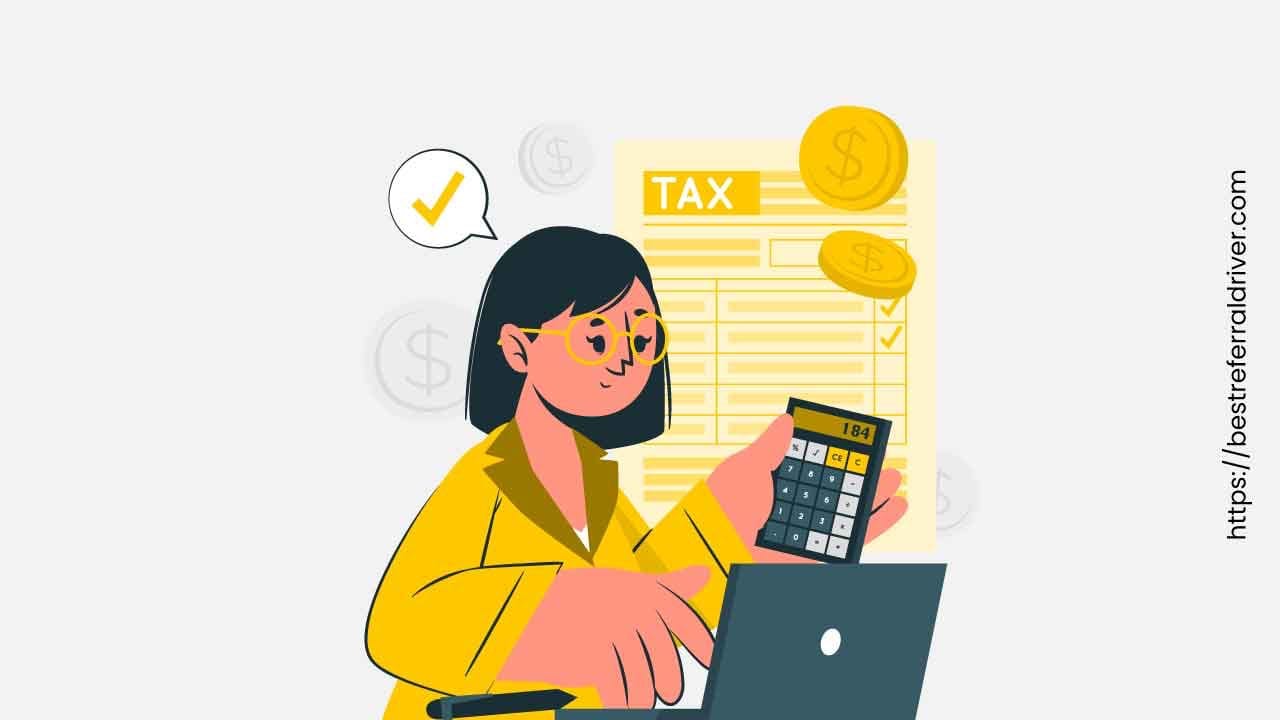Guide to Uber Eats Tax Deductions and Write-Offs for Drivers


Bestreferraldriver is supported by its audience. We write our articles independently but we may earn affiliate commissions when you use links on this page.

Are you an Uber Eats driver, wondering how to maximize your deductions and make the most of your taxes? Struggling to keep track of all the write-offs that come with freelance courier driving ? Look no further—this comprehensive guide will help you understand exactly what tax deductions are available for Uber Eats drivers, so you can deduct correctly and minimize those pesky costs. From vehicle expenses to debt payments and more, we'll review everything step-by-step so it's easy to follow. Don't worry; filing your next tax return doesn't have to be overwhelming! Read on for our helpful tips and advice as a go-to resource on Uber Eats tax deductions.
As an Uber Eats driver and 1099 independent contractor , it's important to understand the basics of tax deductions to maximize your earnings and minimize your tax liability. By taking advantage of eligible deductions, you can potentially save a significant amount of money come tax season.
Tax deductions are expenses that you can subtract from your taxable income, thereby reducing the amount of income that is subject to taxation. For Uber Eats drivers, many everyday expenses can qualify as deductible business expenses if they are directly related to your delivery work.
The following is a comprehensive checklist of the main tax write-offs for Uber eats drivers:
When it comes to substantiating your tax deductions as an Uber Eats driver, maintaining accurate records and documentation is absolutely crucial. By keeping track of all your receipts, invoices, and transaction records, you not only ensure that you can calculate your deductions accurately but also provide evidence in case of an audit. In this comprehensive guide, we will explore essential tips and strategies to help you organize your records effectively, ensuring that you can maximize your tax deductions while staying compliant with tax regulations.
To truly maximize your tax deductions as an Uber Eats driver, it is vital to understand why accurate records and documentation are crucial. First and foremost, keeping detailed records allows you to properly track your deductible expenses, ensuring that you don't miss out on any eligible deductions. Additionally, in the event of an audit, having organized and thorough documentation provides evidence to support your claims and substantiate the legitimacy of your deductions. The IRS requires taxpayers to maintain records for at least three years from the date of filing the tax return, so having a solid record-keeping system ensures compliance and peace of mind.
One of the key aspects of maintaining accurate records is to categorize and organize them effectively. Start by creating separate folders or digital folders for different expense categories such as vehicle expenses, equipment purchases, phone and internet bills, and office supplies. This segregation will make it easier to find and calculate deductions when it's time to file your taxes. It is recommended to use software or apps specifically designed for expense tracking to streamline the process and minimize the risk of losing important documents.
Within each category, consider utilizing sub-categories to further organize your records. For example, under vehicle expenses, you can have sub-categories like fuel costs, maintenance and repairs, car insurance, and registration fees. By doing so, you can easily locate specific records when needed and ensure that your deductions are accurate and well-supported.
In today's digital age, leveraging electronic records and digital documentation can greatly simplify record-keeping for Uber Eats drivers. Consider using mileage tracker apps and other apps or software that allow you to scan and store receipts digitally, eliminating the need to keep physical copies. There are numerous expense-tracking apps available that enable you to capture an image of the receipt, categorize it, and store it securely in the cloud. This not only reduces clutter but also ensures that your records are easily accessible from any device, anytime.
When using digital documentation, it is essential to choose reputable and secure platforms that prioritize data privacy and protection. Opt for services that offer encryption and backup features, providing an extra layer of security for your sensitive financial information. Additionally, regularly back up your digital records to multiple locations or cloud storage services to prevent loss in case of technical issues.
To maintain accurate records, it is crucial to establish a record-keeping routine. Set aside dedicated time each week or month to organize and update your records. This routine will help you stay on top of your documentation and prevent last-minute scrambling during tax season. Consider utilizing reminders or calendar alerts to ensure that you don't overlook this important task.
During your record-keeping routine, meticulously review each receipt and transaction to ensure accuracy. Check that the details are legible, the dates are correct, and the expenses are properly categorized. If you notice any discrepancies or missing information, reach out to the relevant parties, such as merchants or service providers, to obtain the correct documentation.
As previously mentioned, the IRS requires taxpayers to retain records for at least three years from the date of filing the tax return. This timeframe ensures that you have the necessary documentation in case of an audit or any inquiries from tax authorities. However, it is advisable to retain your records for a longer period to be extra cautious. Certain documents, such as loan agreements or property-related records, may need to be kept for even longer periods.
To ensure that your records are easily accessible when needed, consider storing physical documents in a secure location, such as a fireproof safe or a lockable filing cabinet. If you opt for digital documentation, make sure to regularly back up your records and store them on reliable and secure cloud storage services.
Uber Eats drivers are considered self-employed, which means they are responsible for reporting their income and deductible expenses on Schedule C of their annual tax returns. Additionally, you may be required to pay estimated quarterly taxes to avoid penalties for underpayment. It is advisable to consult with a tax professional who can guide you through the process and ensure compliance with tax laws.
Filing taxes as an Uber Eats driver requires careful attention to detail and a good understanding of the tax obligations that come with being self-employed. By keeping certain important things in mind, you can ensure that you meet your tax requirements accurately and take advantage of any available deductions. In this article, we will discuss the key considerations when filing taxes as an Uber Eats driver.
As an Uber Eats driver, you are considered an independent contractor rather than an employee. This means you are responsible for paying self-employment taxes, which include both the employer and employee portions of Social Security and Medicare taxes. Understanding your tax classification is crucial for correctly reporting and calculating your tax liability.
One of the essential aspects of filing taxes as an Uber Eats driver is accurately reporting your income. Uber provides drivers with a Form 1099-K and/or a Form 1099-MISC to report their earnings. It is important to carefully review these forms and ensure that your income is accurately reflected. Additionally, keep track of any cash tips received as they are also considered taxable income.
To minimize your tax liability, it's important to take advantage of eligible deductions. As an Uber Eats driver, you can deduct various business expenses related to your delivery work. Some common deductions include vehicle expenses (fuel, maintenance, insurance), phone and internet expenses, parking fees, tolls, and equipment costs. Keep detailed records of these expenses and consult with a tax professional to maximize your deductions while staying within the bounds of the law.
Vehicle expenses can be a significant deduction for Uber Eats drivers. You have the option to use the standard mileage rate method or the actual expense method to calculate your deductions. The standard mileage rate allows you to deduct a set amount per mile driven for business purposes, while the actual expense method requires you to track and deduct the actual costs associated with your vehicle. Consider which method is more beneficial for your situation and keep detailed records to support your deductions.
As a self-employed individual, you are responsible for paying quarterly estimated taxes to avoid underpayment penalties. Estimate your tax liability based on your income and deductions and make timely payments throughout the year. Failing to pay enough in estimated taxes can result in penalties and interest charges when you file your annual return.
Maintaining accurate and organized records is crucial when filing taxes as an Uber Eats driver. Keep track of all income and expenses related to your delivery work, including receipts, invoices, and mileage logs. This documentation will be necessary if you are audited or need to substantiate your deductions. Consider using accounting software or mobile apps designed for independent contractors to streamline record-keeping processes.
While you can certainly file your taxes as an Uber Eats driver on your own, it may be beneficial to seek professional assistance. Tax laws can be complex, and a tax professional can help ensure that you are taking advantage of all available deductions and credits while remaining in compliance with tax regulations. They can also provide guidance on estimated quarterly tax payments and answer any specific questions you may have related to your tax situation.
Staying informed about changes in tax laws and regulations is crucial for Uber Eats drivers who want to maximize their deductions and stay compliant with tax requirements. Here are some valuable resources to help you stay up-to-date:
By utilizing these resources, you can stay informed about changes in tax laws and regulations, ensuring that you make the most of available deductions and write-offs as an Uber Eats driver. Remember to consult with a tax professional for personalized advice based on your specific circumstances.
Understanding the basics of Uber Eats tax deductions is essential for maximizing your earnings and reducing your tax liability. By taking advantage of eligible deductions such as vehicle expenses, cell phone and internet bills, delivery equipment costs, parking and tolls, and professional services, you can potentially save a significant amount of money come tax season. Remember to keep detailed records and consult with a tax professional to ensure compliance and optimize your deductions.
TRENDING